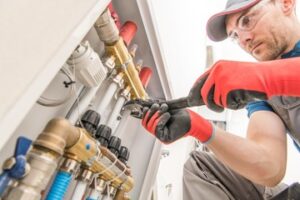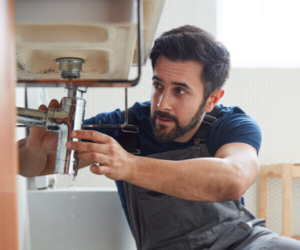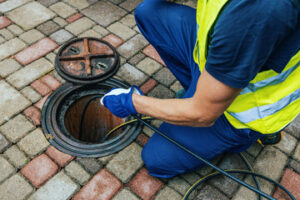Septic Tank Cleaning Perth isn’t pleasant, but it’s essential to the longevity of your septic system. It helps keep sewage from backing into your home and polluting groundwater and surface water.
A septic system that isn’t cleaned regularly can cause sewage to back up into your home, leading to health risks and costly repairs. A septic tank should be cleaned every three to five years.

The septic system filters and treats wastewater, separating it from solid waste, known as sludge. Sludge sinks to the bottom of the septic tank, where bacteria break it down. This process takes time. Monitoring the sludge level is important so it doesn’t rise too high.
When sludge gets too high, it can start to clog the septic tank or septic system drain field. When this happens, sewage can back up into the house and contaminate water and food because unexpected leaks and discharges prevent this; you should get your reaches about a third of the operating depth of the septic tank.
While many people are reluctant to open up their septic tanks to inspect the sludge level, it’s an essential part of septic system maintenance. Septic sludge is a composite of natural waste, including toi, let paper, human and animal waste, and other organic materials. If this isn’t disposed of properly, it can end up in the environment, causing serious health problems for humans and animals.
Prevent your septic tank from overflowing with sludge, and reduce the amount of paper and solid waste you flush down the drains. Tossifeweress paper towels or using a garbage disposal can htes. You should also limit the use of chemical drains open and never pour grease or oil down the drains.
A professional septic tank cleaner can take care of the sludge removal and cleaning for you. They’ll use a high vacuum truck to clean the tank and remove the sludge, leaving room for incoming sewage. They’ll also uncover the inlet and outlet sides of the septic tank to clean the filters there.
If you notice that your septic system smells like sewage, or if it’s not functioning properly, it’s time to call a pro for septic tank cleaning. The foul odor is caused by the buildup of gasses, including hydrogen sulfide, that can be hazardous to your family’s health.
Scum
A greenish, greyish or brown bubbly liquid floats on top of your septic tank. This is the scum layer, which usually contains fats, oils and light-weighted solids that don’t get broken down by bacteria in the tank. It’s pretty normal for some loose bits of toilet paper to be floating around in this layer, too.
Your septic tank separates wastewater into three layers. The scum layer floats on the surface, while the liquid effluent (also known as wastewater) is in the middle and the sludge is at the bottom. The water and waste go out of the septic system through the drain field or leach field, which spreads the pre-processed sewage to the ground outside the home.
Without proper septic tank maintenance, the sludge and scum layers can overwhelm the septic system and cause blockages and environmental contamination. The best way to avoid these problems is to have your septic tank pumped and inspected regularly. Experts recommend a schedule of every three to five years, depending on household usage.
When it’s time to clean the septic tank, professionals use high-powered equipment to break up the sludge and scum, then stirs them up into the liquid portion of the septic tank. They also inspect the septic tank for cracks, leaks and other damage. During this process, they may also remove the baffle filter on the outlet side of the tank. This is done with care and protective gear, as the septic tanks contain hazardous gases.
After the septic tank is cleaned, they can put it back into service. Before they do, they will check the septic tank’s inspection ports and sanitary tee and a baffle filter. This is done to ensure the safety of those who enter the tank, which should only be done by trained professionals.
The experts will then disperse a special cleaning product into the tank to further break down any remaining solids and prevent future clogs and septic tank pumping. This product will also help to kill any harmful bacteria that could be left behind in the septic tank after cleaning.
Roots
Roots are a vital part of a tree’s life. They provide stability and aid in the collection of nutrients. Unfortunately, they can also cause clogs and other problems when they enter a septic tank. Roots are attracted to the nutrient-rich, damp environment of septic tanks and pipes. Once they enter, they can quickly grow into the tank and surrounding piping. This can lead to a variety of issues, including septic system failure, sewage backups and costly repairs.
One of the best ways to keep roots at bay is to maintain a regular septic tank cleaning schedule. A professional cleaner can use high-pressure water jetting to remove any solids that have accumulated in the tank. This is the most effective method for eliminating debris that limits septic tank performance.
Another way to reduce the growth of roots is by using septic tank treatments that promote bacterial growth. These additives help break down waste in the tank and keep it odor-free. They can be purchased at most hardware and convenience stores. You can also flush rock salt down your toilet to kill off existing roots and prevent outgrowth.
Proper disposal of waste is the other key to keeping septic tanks and lines clean. Never flush feminine hygiene products, baby wipes, or cat litter down the toilet. Also, do not pour greasy foods down your drains or sinks. These items can clog your toilets, and they will add to the size of your septic tank, which will require more frequent pumping.
Even if you are diligent about cleaning your septic tank and following these tips, it is important to inspect your septic system regularly. If you notice gurgling water sounds or bad smells, your leach field might be clogged. This is a sign that it’s time for a professional inspection and pumping.
Septic systems are essential for maintaining modern living comforts, but they need to be maintained properly to avoid potential damage and failure. By understanding the problems, taking preventive action, treating current problems and developing long-term management plans, homeowners can preserve a harmonious relationship between nature and their plumbing.
Water
If your septic tank is backed up and your toilets are overflowing, it’s time for a septic cleaning. Even if you haven’t had any problems with your septic system, experts recommend getting it pumped out every three to five years. If you’re doing it yourself, make sure to gather the necessary materials and equipment before starting, such as a shovel or rake, garden hose with a high-pressure nozzle, a septic tank pumping unit, and bacterial additives (if desired). Always wear gloves when working around septic tanks. They can contain toxic gases such as hydrogen sulfide, and pathogens that cause diseases.
Solids in a septic tank settle at different levels, with heavier masses sinking to the bottom and lighter masses, such as grease and oils, floating to the top of the tank as scum. Bacterial action digests the sludge and scum, turning them into liquid effluent that drains through a pipe into the drainfield.
During this process, the septic tank also generates gases, including hydrogen sulfide, which smells like rotten eggs. The bacteria that break down sewage produce these gases to help decompose the waste and keep the water clean. It’s important to have these gases vented to prevent a build-up of pressure that could stop or reverse the flow of wastewater and clog the drainfield.
Most septic systems have a vent that looks like a mushroom and is located on the roof of the tank. It may have a filter to reduce odors. If a septic tank is overfilled, it will overflow into the drainfield and expose people and pets to disease-causing organisms.
The septic tank waste is called septage, and it’s often sent to wastewater treatment plants for further processing. Some municipalities use it as fertilizer for crops. But there’s a debate over whether this practice is environmentally responsible. If the septage isn’t properly treated, it can contaminate drinking water and cause illnesses such as typhoid fever, hepatitis, and dysentery. Also, farmers have complained that septage from septic tanks pollutes their crops with phosphorus and nitrogen. Some states have banned the practice, but others don’t.


